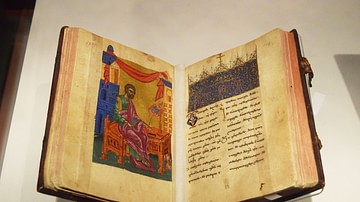Search Definitions
Browse Content (p. 108)

Definition
Ancient Celtic Art
Art, along with language, is perhaps the best way to see the connections between the ancient peoples we label as Celts who lived in Iron Age Europe. There were great variations across time and space but common features of ancient Celtic art...

Definition
Indian Massacre of 1622
The Indian Massacre of 1622 was an attack on the settlements of the Virginia Colony by the tribes of the Powhatan Confederacy under their leader Opchanacanough (l. 1554-1646) and his brother Opitchapam (d. c. 1630) resulting in the deaths...

Definition
Powhatan Confederacy
The Powhatan Confederacy (c. 1570-1646 or 1677) was a political, social, and martial entity of over 30 Algonquian-speaking Native American tribes of the region of modern-day Virginia, Maryland, and part of North Carolina, USA formed under...

Definition
Cernunnos - The Ancient Celtic Nature God
Cernunnos was an ancient Celtic god who represented nature, flora and fauna, and fertility. He is frequently depicted in Celtic art wearing stag antlers or horns and usually a torc around his neck. Few details are known about him but celebrated...

Definition
The Gospels
The New Testament contains four gospels attributed to Matthew, Mark, Luke, and John. The four gospels are not biographies of Jesus, nor are they history as we define it. What each gospel attempted to do was write a theological explanation...

Definition
Ancient Celtic Pottery
The pottery of the ancient Celts, although produced over great distances in space and time, shares several common features no matter where it was made, illustrating that there was contact between people living as far apart as Brittany and...

Definition
Chief Powhatan
Wahunsenacah, also known as Chief Powhatan (l. c. 1547 - c. 1618) was the head of the Powhatan Confederacy of Native Americans who inhabited the region of the modern-day State of Virginia, USA, which they knew by the name of Tsenacommacah...

Definition
Anglo-Powhatan Wars
The Anglo-Powhatan Wars were a series of conflicts between the English colonists of Virginia and the indigenous people of the Powhatan Confederacy between 1610-1646 CE. The Powhatan Confederacy (of over 30 tribes) was led by the chief Wahunsenacah...

Definition
Ancient Celtic Sculpture
The sculpture of the ancient Celts between 700 BCE and 400 CE is nothing if not varied as artists across Europe developed their own ideas and borrowed what interested them from neighbouring cultures. Early Celtic stone and wood sculptures...

Definition
House of Burgesses
The House of Burgesses (1619-1776 CE) was the first English representative government in North America, established in July 1619 CE, for the purpose of passing laws and maintaining order in the Jamestown Colony of Virginia and the other settlements...